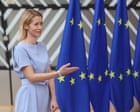
In the dynamic landscape of global politics, recent events have highlighted the strategic maneuvers and diplomatic efforts shaping the future. From Europe’s attempt to reaffirm its influence in the Middle East, to Russia’s recognition of the Taliban government, and internal political processes in Mozambique, these developments paint a picture of a world in flux.
Over recent weeks, European nations have been striving to form a cohesive approach towards Iran. This comes amidst a broader attempt by Europe to assert its influence and remain relevant in Middle Eastern diplomacy. Having previously been key brokers in the Iranian nuclear deal, European countries find themselves challenged to maintain their position at the dialogue table. The importance of this region remains high, as an impulsive approach by other global powers could potentially destabilize the fragile balance in the Middle East. In this context, Kaja Kallas, the European Union’s top diplomat, has been actively reaching out to Iranian officials. Her dialogue with Iran’s foreign minister, Abbas Araghchi, illustrates Europe’s effort to act as a bridge, helping to prevent the crisis from stagnating, particularly urging Tehran to allow UN weapons inspectors into the country.
As Europe navigates its role, Russia has made a decisive move, becoming the first country to officially recognize the Taliban’s rule in Afghanistan. This significant geopolitical development follows discussions between Russian officials and the Taliban, who have been in power since 2021 after expelling the previous government. The Taliban’s leadership praised Russia’s recognition as a ‘brave decision,’ emphasizing their version of strict Islamic law governance. The complexities of Afghanistan’s status on the world stage, alongside formal recognition by Russia, underscore the shifting alliances and political currents in Asia.
While global attention shifts across different continents, in Africa, political processes continue to evolve. In Mozambique, former presidential candidate Mondlane has pursued legal routes to address delays in the formal registration of his political party. He pointed out that the Ministry of Justice had not processed his party’s registration request within the legally defined timeline, prompting him to appeal to the Constitutional Council. This highlights ongoing challenges within Mozambique’s political system, reflecting broader themes of governance and transparency that resonate across many nations.
These diverse narratives—European diplomatic efforts, Russian foreign policy actions, and Mozambican domestic politics—demonstrate the interplay of ambition, strategy, and governance in shaping global and local realities. They reflect a world where nations recalibrate their roles, seek recognition, and strive for lawful processes amidst evolving geopolitical and domestic landscapes.
Supporting this interconnected political ecology, international diplomacy remains pivotal. Whether it is to maintain dialogue with potentially isolated nations, recognize new regimes, or uphold legal procedures, the pursuit of stability through diplomacy is a consistent thread. While the outcomes are yet to fully unfold, the calm navigation of these complex issues offers a reassuring progression towards a more stable future.
In summary, the ongoing collaborative and individual efforts by countries worldwide to engage in dialogue and recognize governance structures serve as a testament to the gradual pursuit of peace and legal integrity. As developments occur, the world watches with cautious optimism, hopeful that these actions will lead to a more harmonious global order.
Source: {link}
